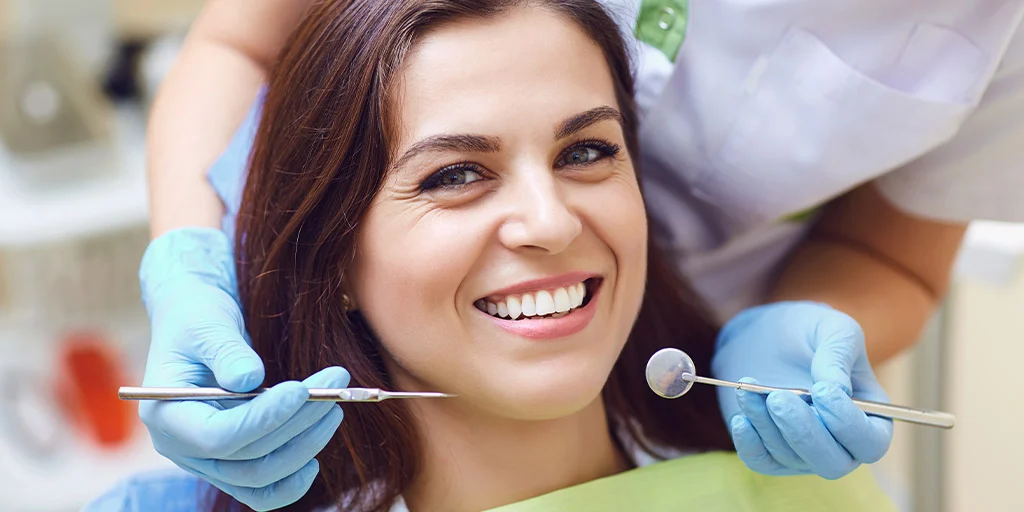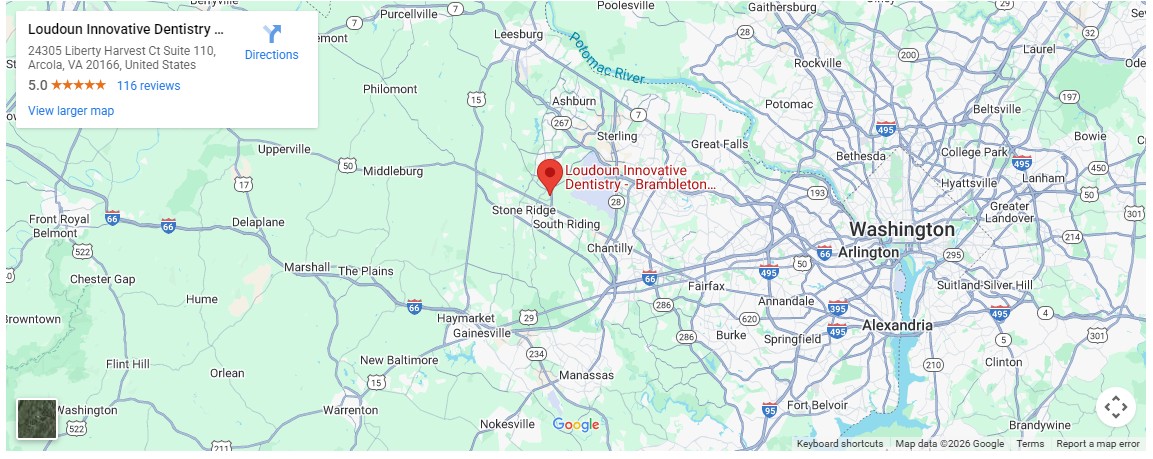Common Dental Emergencies and How to Handle Them: Advice from Dr. Mahgoub

Dental emergencies can happen when we least expect them, causing pain, anxiety, and disruption to our daily lives. At Loudoun Innovative Dentistry in Sterling, VA, Dr. Abdullah Mahgoub and his team are committed to providing prompt, effective care for dental emergencies. In this blog post, Dr. Mahgoub shares his expert advice on how to handle common dental emergencies until you can receive professional care.
Understanding Dental Emergencies
“A dental emergency is any situation that requires immediate attention to alleviate severe pain, save a tooth, or stop ongoing tissue bleeding,” explains Dr. Mahgoub. “Knowing how to respond in these situations can make a significant difference in the outcome.”
Common Dental Emergencies and How to Handle Them
1. Severe Toothache
A severe toothache can be caused by various factors, including decay, infection, or trauma.
What to do:
- Rinse your mouth with warm water to clean it out.
- Gently use dental floss to remove any food caught between teeth.
- Apply a cold compress to the outside of the cheek to reduce swelling.
- Take over-the-counter pain relievers, but do not place aspirin directly on the gum or tooth.
Dr. Mahgoub advises, “While these steps can provide temporary relief, it’s crucial to seek professional care promptly. Severe tooth pain can indicate a serious underlying issue that needs immediate attention.”
2. Knocked-Out Tooth
A knocked-out tooth is a time-sensitive emergency. Quick action can increase the chances of saving the tooth.
What to do:
- Handle the tooth by the crown (top), not the root.
- If dirty, rinse it gently with milk or water, but do not scrub it.
- Try to reinsert the tooth in its socket if possible. If not, keep it moist by placing it in milk, saltwater, or between your cheek and gums.
- Get to a dentist as quickly as possible, ideally within 30 minutes.
“Time is of the essence with a knocked-out tooth,” stresses Dr. Mahgoub. “The sooner you can get to our office, the better the chances of saving the tooth.”
3. Chipped or Broken Tooth
A chipped or broken tooth can be painful and potentially lead to further damage if not addressed promptly.
What to do:
- Rinse your mouth with warm water to clean the area.
- Apply a cold compress to the outside of the cheek to minimize swelling.
- If you can find the broken piece of tooth, keep it and bring it to the dentist.
- Cover the broken edge of the tooth with dental cement (available at most drugstores) if you can’t see a dentist immediately.
“Even if a chipped tooth isn’t causing pain, it’s important to have it examined,” says Dr. Mahgoub. “Sharp edges can cut your tongue or cheek, and the damage may be more extensive than it appears.”
4. Lost Filling or Crown
A lost filling or crown can expose the sensitive inner parts of your tooth, causing pain and increasing the risk of further damage.
What to do:
- For a lost filling, place a piece of sugar-free gum into the cavity as a temporary measure.
- For a lost crown, try to slip the crown back over the tooth. Use dental cement, denture adhesive, or toothpaste to hold it in place temporarily.
- Do not use super glue.
“These are temporary solutions,” Dr. Mahgoub emphasizes. “It’s important to see us as soon as possible to properly reattach the crown or replace the filling.”
5. Abscess
An abscess is a severe infection that can potentially spread to other parts of your body if left untreated.
What to do:
- Rinse your mouth with a mild salt-water solution (1/2 teaspoon of salt in a cup of water) several times a day to draw the pus to the surface and relieve pain.
- Apply a cold compress to the outside of the cheek to reduce swelling.
“An abscess is a serious condition that requires immediate professional attention,” warns Dr. Mahgoub. “If you notice swelling in your gums or face, or a pimple-like bump on your gum, contact us right away.”
6. Soft Tissue Injuries
Injuries to the soft tissues of the mouth (lips, tongue, cheeks) can result in bleeding.
What to do:
- Rinse your mouth with a mild salt-water solution.
- Apply pressure with a clean cloth or gauze to stop bleeding.
- Apply a cold compress to the outside of the affected area to reduce swelling.
“If bleeding doesn’t stop after 15 minutes of applying pressure, it’s time to seek emergency care,” advises Dr. Mahgoub.
Preventing Dental Emergencies
While not all dental emergencies can be prevented, there are steps you can take to reduce your risk:
- Maintain good oral hygiene to prevent decay and infection.
- Wear a mouthguard during sports activities.
- Avoid chewing on hard objects like ice or hard candies.
- Use scissors, not your teeth, to cut things.
- Schedule regular dental check-ups to catch potential issues early.
“Prevention is always better than cure,” says Dr. Mahgoub. “Regular dental visits allow us to identify and address potential problems before they turn into emergencies.”
Loudoun Innovative Dentistry’s Approach to Dental Emergencies
At Loudoun Innovative Dentistry, we understand that dental emergencies can be stressful and frightening. That’s why we’ve implemented several measures to ensure our patients receive prompt, effective care:
- Same-Day Emergency Appointments: We reserve slots in our daily schedule for emergency cases.
- After-Hours Support: We provide guidance for managing emergencies that occur outside of office hours.
- Advanced Technology: Our state-of-the-art equipment allows for quick and accurate diagnoses, even in emergency situations.
- Comprehensive Care: We’re equipped to handle a wide range of dental emergencies in-house, minimizing the need for referrals.
- Pain Management: We prioritize patient comfort and offer various options for pain relief during emergency treatments.
“Our goal is to not only address the immediate issue but also to identify and treat the underlying cause to prevent future emergencies,” explains Dr. Mahgoub.
When to Seek Emergency Care
While the steps outlined above can help manage dental emergencies temporarily, it’s crucial to know when to seek immediate professional care. Dr. Mahgoub advises seeking emergency dental care if you experience:
- Severe, persistent pain
- Significant swelling of the gums or face
- Uncontrolled bleeding
- A knocked-out permanent tooth
- Signs of infection (fever, swelling, pus)
“When in doubt, it’s always better to err on the side of caution and give us a call,” says Dr. Mahgoub. “We can assess your situation over the phone and guide you on the best course of action.”
Be Prepared, Stay Calm
Dental emergencies can be alarming, but being prepared and knowing how to respond can make a significant difference in the outcome. Remember, the tips provided in this post are for temporary relief and are not substitutes for professional dental care.
“In any dental emergency, the most important things are to stay calm and act quickly,” Dr. Mahgoub concludes. “At Loudoun Innovative Dentistry, we’re here to provide the expert care you need, when you need it most.”
By understanding how to handle common dental emergencies and knowing when to seek professional help, you can protect your oral health and potentially save a tooth. Keep our contact information readily available, and don’t hesitate to reach out if you’re facing a dental emergency.
Remember, your oral health is an integral part of your overall well-being. At Loudoun Innovative Dentistry, we’re committed to providing comprehensive, compassionate care for all your dental needs – both routine and emergency. Stay prepared, stay informed, and know that we’re here to help when you need us most.




